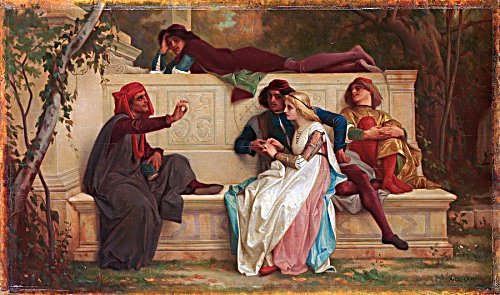|
Joseph S. Salemi THE
IMPORTANCE OF
NOT
BEING EARNEST _________________
What keeps me coming back to them? Simple. It’s their absolute dedication to poetry qua poetry. The formulation “poetry qua poetry” is a scholastic structure that just means poetry in and of itself, without reference to any subject or topic or ideology. Skelton, Herrick, Pope, Byron, and the others all had very different views about the world and human behavior. But they also knew damned well that the craft of poetry exists independently of any possible intellectual notion or moral commitment or religious belief. And the corollary to this is the fact that (brace yourself, dear reader) no poem will be saved from failure exclusively by being edifying, uplifting, inspiring, heart-warming, celebrational, or just plain “nice.” To put it more cynically, an honest, humane, God-fearing poltroon who believes in democracy and universal brotherhood will not necessarily be a good poet. In fact, the chances are pretty good that he’ll be lousy. Villon was a chronic thief, and only a royal pardon saved him from being hanged for manslaughter. Skelton was an ambitious priest who kept his concubine and bastard child in the parish rectory. Ben Jonson was an actual murderer who escaped capital punishment by claiming benefit of clergy. Herrick and Rochester wrote hilariously obscene stuff at times. Byron was a scapegrace and a serial fornicator. Ernest Dowson was a drug addict, and possibly a pedophile. Swinburne was a severe sadomasochist. This list could be extended indefinitely, but the point is clear. Brilliant poets are not necessarily made in the image of Goody-Two-Shoes. And neither is their poetry. Edifying, uplifting, inspiring, heart-warming, celebrational, nice… these words epitomize all that is askew with a great many contemporary attempts at formalist poetry. It’s not a question of liberal versus conservative, or Protestant versus Catholic, or even free-verse partisan versus formal metricist. It goes much deeper than those labels, because poets of all political and religious persuasions in America have an ingrained habit of writing in a prosaically didactic , optimistic, declamatory, and upbeat manner, as if they were activities directors on a cruise ship, trying to make sure that all the passengers are happy and amused. Is poetry of this sort possible, and does it have a place in the world of letters? Yes, of course. Nobody denies that. But it is also true that most poetry of this type is not of the highest rank, nor is it the normal product of well-experienced professional writers. It is, in a word, amateurish. The personal motivation behind such amateur poetry is pretty clear, and also rather common. The poet says to himself I am profoundly moved by something, or filled with patriotism, or strongly in favor of a principle, or enraptured by my religious beliefs, and I’m going to pour forth my feelings in a no-nonsense trumpet-blast of straightforward, verbally plain statement! And all my right-thinking readers will shout Hurrah! And more often than not, that’s what many supposedly conservative people do. As I have said, such poetry is possible, and has its place at times. No argument there. But most of the poems so produced are analogous to the simple stories in a third-grade reader. They are in the lowest rank of literature. They lack maturity, complexity, intricacy, and style. Such poetry assumes that moral edification, uplift, inspiration, and the defense of virtue (or “moral values”) are the proper aims of the poet, when in fact for a real poet those goals are the farthest things from his mind! Poets are not priests or ministers or social workers. They are artists and magicians. The mature professional poet is a master of language, not of rah-rah hype. He’s not there to blare out clichés and protestations, like a politician at a rally. His job is to use the English language in the most powerfully effective and striking way that he can manage. His diction, syntax, tropes, and figures of speech must be top-notch. Let me put it in the form of a counter-intuitive maxim: The words in a poem are not the vehicle for the subject; the subject is the vehicle for the words. When you are a young amateur poet, your natural tendency is to think that meaning and subject matter are the heart of your poetic labors. You think you “have something important to say.” You ate very much concerned about “the truth.” Your heart throbs with moral rectitude. You want to sermonize and convert people. But frankly, that’s seeing things ass-backwards, as we say in Brooklyn. Do we really care that Macbeth murders Duncan, or that Romeo is in love with Juliet? These are just well-worn exempla of ambition and youthful desire around which Shakespeare has woven his dazzling web of words. If the same stories were retold in the soporific blandness of modern Basic English, we’d dismiss them as pathetic melodramas. Herein lies a good rule of thumb for any writer of fictive mimesis: What you say is comparatively unimportant; the manner and style in which you say it is crucial. Consider the first line of Poe’s short story The Cask of Amontillado: The thousand injuries of Fortunato I had borne as best I could, but when he ventured upon insult, I vowed revenge. That sentence is pure verbal magic, and an amazing creative artifact. It is a compound sentence, the first half of which transposes its direct object in front of the subject, verb, and adverbial modifier. The second half transposes a dependent clause in front of the second subject and verb. Would anyone, even in Poe’s day, have spoken in such a manner? Certainly not, but Poe wasn’t interested in how people speak, or in making some kind of straightforward and plain statement. He wanted to set the stage for his horrifying story by zeroing in on injuries, and then on how the speaker had borne them, and then on the deeper wound of insult, and then on the pitiless consequence of revenge. The sequence is all very deliberate and thought out, as everything in verbal fiction must be. Imagine a club-footed Basic English version: I had taken a lot of crap from Fortunato and put up with it, but I decided to get even after he insulted me. That’s not literature. That’s sending a telegram. Poe’s original sentence makes you want to read on, to learn the tangle of hatred and the promise of violence that it suggests. It tempts your curiosity, and draws you onward into a web of irony, sarcasm, mysterious references, studied deception, glimpsed implications of a bitter history, and finally slow murder—all experienced by the reader in the deep mazy caverns of an ancient wine cellar. The final Latin quote at the story’s close (In pace requiescat!) slams down like the lid on a stone sarcophagus. Too many contemporary poets simply can’t pull this off. They just are unable to crank up the engine of their imagination to produce terror, mystery, unexpected and unsettling language, sexual innuendo, and that acid-splash of insouciant offensiveness that makes a poem really worth reading. They can’t do it because they are too damned nice. The psychological source of the problem I am trying to describe is earnestness. When you are powerfully in earnest, when you are sincere, when you urgently want to “tell” things to other people, you are not in the proper frame of mind to write excellent poetry. The stuff you produce will most likely be clunky, pedestrian, and tedious. It will certainly be inelegant. If you add to all these defects the misfortune of being a moral pietist who is anxious to always be deemed decent and upright and religiously rectitudinous, your poems will be unbearable. I know some persons will object that my satirical poetry is very direct and straightforward in the expression of my own views. Yes, I admit that. But satire is an unusual genre in that it necessarily takes an adversarial stance towards the world, and also towards its readership. Satire has to be effectively aggressive, and that means being unambiguous. It must hit hard, in all the vulnerable spots of its target. For this reason satire has to be more declamatory and direct than other forms of verse. It can’t wallow in nuance, or raise unanswered questions, or hint at unspoken implications. Satire is saved from cloudiness by its overt hostility and venom. The poetry that I am objecting to here is kind that trumpets feelings and praise and belief as a kind of Pledge of Allegiance or—worst of all—an “edifying” sermon that publicly celebrates its own triumphalism. Such “edifying” poems are boring, and no different from liberal virtue-signalling. Poems are not written to edify people! Poems are, first and foremost, designed to intrigue readers and interest them, to entertain them and shock them, to dazzle them with amazing language and rhetoric, to hit them with something they did not expect or even imagine. That’s why in criticism I frequently use the metaphor of “pyrotechnics” to describe the work of a powerful poet. His words shock you and unsettle you. He makes a brilliant explosion of sound and color. There’s a whiff of sulphur, propellant, and picric acid as you read his work. He’s not babying you with moral lessons (at least not all the time), or piously pushing you towards righteousness. He’s knocking you out with the Roman candles of language, and that’s what gives the force to whatever he happens to be saying. This is my personal opinion, of course—but what else can I assert other than my preferences? I’d like to see more contemporary formalist poetry that is ironic, suggestive, comical, allusive, scholarly, oblique, combative, and verbally elegant. I’d like to read more poems that are not obviously directed towards some audience, but which are completely wrapped up in their own perfection as verbal artifacts. I’d like to see a poem that is meant to exist as a self-contained confection on the printed page, and not as something to be posted on Twitter as a campaign slogan. It is very important not to be earnest.
___________________________________
Joseph S. Salemi has published poems, translations, and scholarly articles in over one hundred journals throughout the United States, Canada, and Great Britain. His four collections of poetry are Formal Complaints and Nonsense Couplets, issued by Somers Rocks Press, Masquerade from Pivot Press, and The Lilacs on Good Friday from The New Formalist Press. He has translated poems from a wide range of Greek and Roman authors, including Catullus, Martial, Juvenal, Horace, Propertius, Ausonius, Theognis, and Philodemus. In addition, he has published extensive translations, with scholarly commentary and annotations, from Renaissance texts such as the Faunus poems of Pietro Bembo, The Facetiae of Poggio Bracciolini, and the Latin verse of Castiglione. He is a recipient of a Herbert Musurillo Scholarship, a Lane Cooper Fellowship, an N.E.H. Fellowship, and the 1993 Classical and Modern Literature Award. He is also a four-time finalist for the Howard Nemerov Prize. His upcoming books, Gallery of Ethopaths, and a collection of critical essays, are forthcoming. |
 There
are many classic poets whose work I love, but only a few to whom I
return regularly. These few are Villon, John Skelton, Robert Herrick,
the Earl of Rochester, Alexander Pope, Lord Byron, Dowson, and Swinburne,
plus a scattering of other writers when they are not on their best
behavior.
There
are many classic poets whose work I love, but only a few to whom I
return regularly. These few are Villon, John Skelton, Robert Herrick,
the Earl of Rochester, Alexander Pope, Lord Byron, Dowson, and Swinburne,
plus a scattering of other writers when they are not on their best
behavior. 